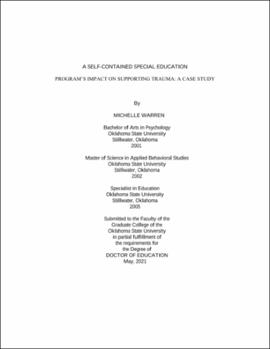| dc.contributor.advisor | Curry, Katherine | |
| dc.contributor.author | Warren, Michelle | |
| dc.date.accessioned | 2021-09-23T19:42:44Z | |
| dc.date.available | 2021-09-23T19:42:44Z | |
| dc.date.issued | 2021-05 | |
| dc.identifier.uri | https://hdl.handle.net/11244/330841 | |
| dc.description.abstract | The purpose of this qualitative study is to explore teacher perceptions regarding the influence of specialized training and Emotional Behavior Disorder (EBD) programming to support students with special needs who have also experienced trauma. This study used purposeful sampling to select two elementary schools housing the EBD program targeted in this study. The study participants included administrators, special education teachers, and support staff who worked within the EBD program. Data were collected through interviews of four administrators, three special education teachers, and six support staff, observations, documents, and photographs. Identification of Trauma Informed Schools, as defined by the National Child Traumatic Stress Network (2017), as the theoretical framework provided a lens through which to analyze the data collected at the two sites. The Trauma Informed Schools framework establishes the "4 R's": recognizing the impact of trauma, recognizing the signs and symptoms of trauma, responding by integrating knowledge of trauma in all facets of the system, and resisting retraumatizing individuals through trauma informed practices. The framework also creates a multi-tiered framework to best support trauma informed practices. Findings confirmed that teachers and staff perceived the training relevant to the EBD program as vital to addressing the needs of the students they support through understanding trauma and through providing a systematic, multi-tiered approach to address student needs. The context of the state at the time of this study significantly impact the needs of the students in Oklahoma through high poverty, high rates of adverse childhood experiences in school aged children, and limited access to mental health services. Additional research could apply the framework of Trauma Informed Schools to the entirety of the school district in this study, considering the impact on various demographic groups. | |
| dc.format | application/pdf | |
| dc.language | en_US | |
| dc.rights | Copyright is held by the author who has granted the Oklahoma State University Library the non-exclusive right to share this material in its institutional repository. Contact Digital Library Services at lib-dls@okstate.edu or 405-744-9161 for the permission policy on the use, reproduction or distribution of this material. | |
| dc.title | Self-contained special education program's impact on supporting trauma: A case study | |
| dc.contributor.committeeMember | Harris, Edward | |
| dc.contributor.committeeMember | Richardson, Shawna | |
| dc.contributor.committeeMember | Duhon, Gary | |
| osu.filename | Warren_okstate_0664D_17082.pdf | |
| osu.accesstype | Open Access | |
| dc.type.genre | Dissertation | |
| dc.type.material | Text | |
| thesis.degree.discipline | School Administration | |
| thesis.degree.grantor | Oklahoma State University | |
